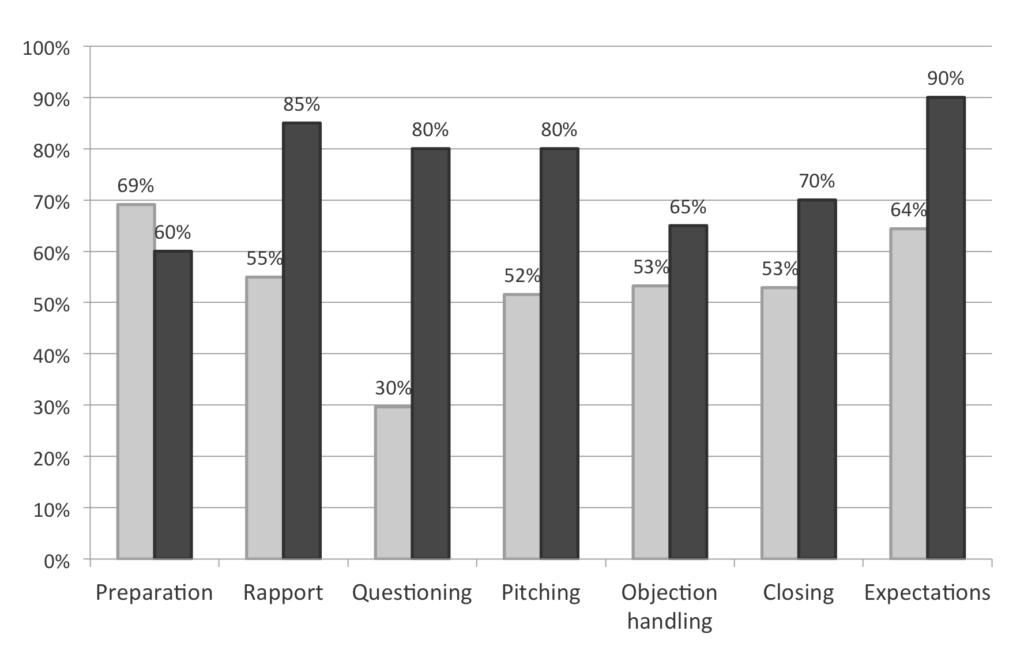Sales Consultants
Salestrong’s Sales Consultants help our clients to achieve sales excellence by improving the effectiveness of their sales investments and sales interactions with customers. This is done by identifying and driving efficiencies in face-to-face sales, inside sales, third-party channel partner sales, and the associated back office/sales operations.
Salestrong Sales Consultants’ approach sales transformation at three levels:
- People – giving sales people the mindset and capability to thrive in today’s competitive environment
- Leaders – giving sales leaders the ability to coach and develop high performing sales teams
- Organisations – giving the tools, measures and culture that allows sales capability to thrive
The Salestrong Consulting Approach
Salestrong’s Sales Consultants focus on how and to whom companies sell their products and services, the channels to market they use, and the back-office operations that support front line sales. Salestrong Sales Consultants can help clients address specific challenges in their go-to-market strategy, sales-force effectiveness, key-account management, and other relevant areas. The Salestrong Sales Consulting team consists of 10 partners and faculty in Europe and North America.
1) Understanding the Internal and External Sales Environment
All Salestrong Sales Consultants have served in sales at individual contributor and manager level. Time in the field and/or on the phone with our clients’ sales people means that they get to know the sales environment and can assess first hand the strengths and weaknesses. The sales consultants measure sales performance in the field and this is compared to measures from the sales management team. It is often the case that these two sets of measurement data produce different results. Here we can see that the management team, in black, produced a far more optimistic view of their teams capabilities than the sales consultants, in grey:
Using the data from the sales consultants to challenge the management team on their understanding of high performance, results in reality based conversation about performance. It also allows for interventions to be based on real issues and not perceived issues, which is a major failure point of most sales transformation projects.
Time spent with our client’s customers ensures that they have a first hand working knowledge of real customers in their native environment. In these customer interactions, we find customers will talk about their buying experiences in a way that they will not do, or can not do, with our clients. In these impartial customer interactions, insights can be generated which helps us to improve sales performance through customer alignment. Capturing these interactions on video helps us to challenge the world view of the sales teams with clarity and authority.
2) Bespoke Intervention Design
There are, of course, similarities between Salestrong clients. But we have found that an approach that suits one client, could actually damage another. For example, recently we undertook two sales transformation projects in the financial services industry. We found similarities between the clients in terms of:
- Deal size
- Deal frequency
- Time to close
- Regulatory requirements
- A mix of phone and field based interactions with the customer
- Tenure of the sales team
On the face of it, the programme we designed for one client could have fitted the other. But what we found when we interviewed customers and spent time with the sales teams and management teams of both, was that the cultures and company brands were very different. The resulting programmes that we designed were very different in terms of content, style and delivery. The approach used in one would have been harmful in the other, confirming our core beliefs that:
- Sales effectiveness interventions should start with the customer’s buying process – and that needs to come directly from the customer and not to be filtered by the sales teams
- Sales effectiveness interventions work at the cultural level and need to be approached from a change management perspective – one off interventions have little effect over time, there needs to be a sustained programme of events that are supported by all levels of management
- Sales effectiveness will only be sustainable if it aligns with and reinforces the company values and brand
3) Quality of Sales Consultants
The quality of sales consultants used in a sales transformation programme is a critical success factor. Salestrong recommend three key areas of focus when selecting sales consultants for sales transformation programmes:
Core capability
Select sales consultants who can challenge their audiences. To do this they need to have field scars of their own. They need to be able to contract with their audiences effectively, build trust quickly and demonstrate a high level of credibility.
On-boarding
Spend a significant amount of resource on-boarding sales consultants for the programme. It is essential that the insights found in the diagnostic phase are shared.
Cultural fit
Select sales consultants who share the values of the organisation that they will be working with. There needs to be a good cultural fit.
Conclusion
Sales Consultants help to achieve sales excellence by improving the effectiveness of sales investments and sales interactions with customers. Sales consultants should be involved in the diagnostic phase, communications and intervention delivery. Recruit sales consultants who have the capability to challenge, have been on-boarded successfully and have a good cultural fit.


